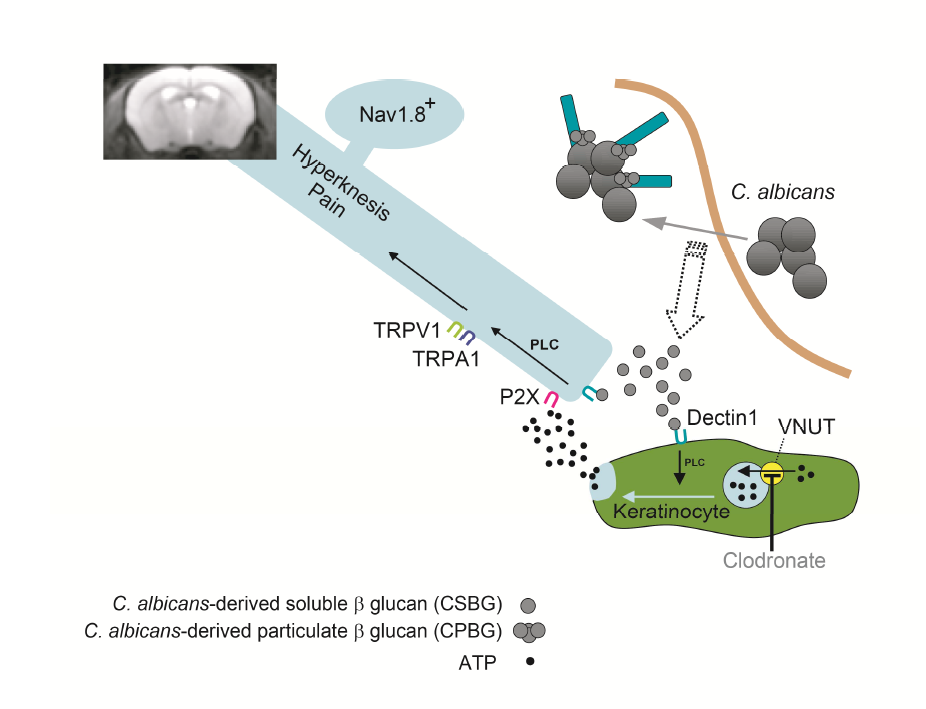Osaka University study shows that the Dectin-1 to TRP channel pathway is a novel signaling mechanism in the onset of pain, and that inhibition of the VNUT ATP transporter blocks candidiasis-mediated pain
Osaka, Japan – Candida albicans infection (candidiasis) can cause skin, genital, or oral pain. Many studies have attempted to understand the source of pain in candidiasis; none have provided a clear explanation, until now.
In a new study published in iScience, “The ATP transporter VNUT mediates induction of Dectin-1-triggered Candida nociception,” a research team led by experts from Osaka University investigated the role of Dectin-1, a β-glucan receptor, in the sensing of fungal infection. They found that Dectin-1 was critical for the onset of pain related to fungal infection.
Candidiasis is an infection that causes skin or oral pain in many individuals. It frequently occurs in patients who are immunocompromised or have poorly controlled diabetes. Additionally, it affects a large proportion of women, causing vulvovaginal pain in approximately 75% of women worldwide at some point in their lifetimes, and causing severe nipple pain in some lactating women. Despite a variety of efforts to understand the mechanisms of such severe pain in candidiasis, the primary effective treatment has been resolution of the infection, which does not occur quickly, particularly in immunocompromised patients.
“We previously found that fungal infection stimulated pain through β-glucan nociceptors, such as Dectin-1, but we did not know whether these receptors directly interacted with Candida fungi,” says Kenta Maruyama, lead author on the study. “We were excited to find that β-glucan–induced pain is abolished in Dectin-1 and TRPV1/TRPA1 deficient mice.”
In the study, the researchers found that β-glucan stimulates nociceptors via the Dectin-1–PLC axis, activating neurons. Notably, components secreted from fungal cells caused the same activation of nociceptors.
“Our analyses revealed that β-glucan-induced allodynia (pain) is dependent on extracellular ATP and VNUT, an ATP transporter,” says Maruyama. “We found that the VNUT inhibitor clodronate can be used to treat β-glucan-induced allodynia.”
In addition to identifying a mechanism to block fungal pain in mice, the researchers identified a new signaling pathway, from Dectin-1 to TRP channels in the generation of pain and found that the ultimate activation of such pain was critical for the resolution of fungal inflammation.
Candidiasis is a painful infection that affects a large number of individuals, and may cause extreme pain in some cases. This study has shown that the Dectin-1 pathway could be an important new target for treatment of candidiasis, and that clodronate may provide a readily available therapy that may be quickly used in clinical treatment of severe fungal pain.

Figure: The newly discoverd innate sensory mechanisms mediated by Dectin-1 and VNUT, which detect fungal infection.
(Credit: Osaka University)
***
The article, "The ATP transporter VNUT mediates induction of Dectin-1-triggered Candida nociception," was published in iScience, https://doi.org/10.1016/j.isci.2018.08.007.
Primary keyword: Medicine/Health
Additional keywords: Pain, Immunology/Allergies/Asthma, Infectious/Emerging Diseases, Gynecology, Mycology
Article: The ATP transporter VNUT mediates induction of Dectin-1-triggered Candida nociception
Journal: iScience
DOI: https://doi.org/10.1016/j.isci.2018.08.007
Authors: Kenta Maruyama, Yasunori Takayama, Erika Sugisawa, Yu Yamanoi, Takashi Yokawa, Takeshi Kondo, Ken-ichi Ishibashi, Bikash Ranjan Sahoo, Naoki Takemura, Yuki Mori, Hisashi Kanemaru, Yutaro Kumagai, Mikaël M. Martino, Yoshichika Yoshioka, Hisao Nishijo, Hiroki Tanaka, Atsushi Sasaki, Naohito Ohno, Yoichiro Iwakura, Yoshinori Moriyama, Masatoshi Nomura, Shizuo Akira, Makoto Tominaga
Funding (max. 255 characters incl. spaces)
Japan Intractable Diseases Research Foundation, Japan Rheumatism Foundation, Akashi Medical Research Foundation, Kanzawa Medical Research Foundation, TERUMO Foundation for Life Sciences and Arts, Life Science Foundation
Summary (max. 75 words)
Candidiasis is a painful infection that affects a large number of individuals, occasionally causing severe pain that is solely controlled by resolution of infection. Here, Dectin-1 inhibition was found to block pain during fungal infection. Osaka University researchers found that clodronate, a drug that is currently used for osteoporosis treatment, could suppress severe pain in fungal infection, and that the Dectin-1 pathway could be an important new target for treatment of pain.
Twitter Comments (max. 150 characters incl. spaces)
ATP transporter inhibition can treat Dectin-1-mediated candidiasis pain #iScience

National Institute for Physiological Sciences (NIPS)